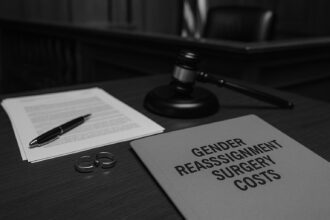Northern Ireland Education Minister Paul Givan has reinforced his support for the UK Supreme Court’s April 2025 ruling that defines ‘woman’ strictly by biological sex, advising that transgender girls should not use female sports or facilities in schools. The ruling has ignited fierce debate across rights groups and political leaders, as education policies grapple with the balance between legal protections for biological females and transgender inclusivity.
Paul Givan, the Northern Ireland Education Minister, has reaffirmed his position regarding the participation of transgender individuals in gender-segregated school activities. He expressed that a boy who identifies as a girl should not participate in girls’ sports or use female facilities, such as changing rooms and toilets. This statement aligns closely with the recent UK Supreme Court ruling that defines a woman strictly in terms of biological sex, a decision that has stirred significant public debate.
In an address to the Northern Ireland Assembly, Givan highlighted the need for the Department of Education to align its policies with the Supreme Court’s ruling. This ruling, delivered in April 2025, clarified that ‘woman’ under the Equality Act 2010 refers exclusively to individuals born biologically female. This legal definition effectively excludes transgender women from claiming rights related to sex-based services and spaces, sparking a complex dialogue about the implications for both women’s rights and transgender individuals’ rights.
The Supreme Court’s decision has been viewed variably by different groups. Advocates for women’s rights have largely welcomed the ruling, viewing it as a reinforcement of protections for biological females in contexts such as sports and single-sex services. However, LGBTQ+ advocates have condemned it as a step backward for transgender rights, raising concerns that it might legitimise discrimination against transgender individuals. The UK’s highest court determined that the biological definition of sex must be maintained to avoid diluting sex-based rights, which has intensified discussions surrounding the delicate balance of rights and protections in society.
This ruling stemmed from a challenge presented by For Women Scotland against official guidance from the Scottish government, which allowed the inclusion of transgender women with gender recognition certificates in women’s representation quotas. The judiciary’s interpretation emphasised that legal definitions must rely on biological facts rather than gender identity, affecting various sectors including healthcare, sports, and educational environments.
Among the reactions to the ruling, British Prime Minister Keir Starmer expressed his support, stating that it resolved longstanding ambiguities regarding the rights of women in single-sex spaces. This endorsement echoes a broader sentiment within sections of the political landscape, while simultaneously igniting protests and resistance from LGBTQ+ groups advocating for an inclusive recognition of gender identity.
While legal frameworks continue to evolve, the impact of the Supreme Court’s ruling on the ground remains a pressing issue. Transgender individuals face substantial barriers in accessing spaces traditionally reserved for biological females, such as toilets and hospitals, although the court did affirm that all individuals, regardless of gender identity, should be protected from discrimination.
Givan’s statements reflect a cautious approach by government officials navigating these contentious waters, with a focus on compliance with the law while addressing the complexities of human rights. This ongoing discourse illustrates a critical juncture in the UK, where the delineation of rights based on biological sex versus gender identity is being rigorously examined.
As the educational sector contemplates the implications of these legal clarifications, it remains to be seen how policies will be formulated to respect both the rights of transgender individuals and the legal protections of women, ensuring that inclusivity does not come at the cost of exclusion.
Reference Map
- Paragraphs 1, 2
- Paragraphs 3, 4, 5
- Paragraphs 3, 4, 5
- Paragraphs 3, 4, 5
- Paragraphs 3, 4, 5
- Paragraphs 3, 4, 5
- Paragraphs 3, 4, 5
Source: Noah Wire Services
- https://m.belfasttelegraph.co.uk/news/education/its-important-i-follow-the-law-givan-states-need-to-ensure-gender-guidance-in-line-with-supreme-court-ruling/a1017781587.html – Please view link – unable to able to access data
- https://www.reuters.com/world/uk/uks-highest-court-rule-definition-woman-under-equality-laws-2025-04-15/ – In April 2025, the UK Supreme Court ruled that the legal definition of ‘woman’ under the Equality Act 2010 refers to biological sex, excluding transgender women. This decision clarified that single-sex services can lawfully exclude trans women, a ruling welcomed by women’s rights advocates but criticized by LGBTQ+ groups concerned about potential discrimination.
- https://apnews.com/article/d2f2204a498ad3ca1292f2f6f3b8e950 – The UK Supreme Court’s April 2025 ruling defined a ‘woman’ under the Equality Act 2010 as someone biologically female, excluding transgender women. This decision stemmed from a challenge by For Women Scotland against Scottish government guidance that included trans women with gender recognition certificates in women’s representation quotas, raising concerns about the impact on transgender rights.
- https://time.com/7278363/what-to-know-uk-supreme-court-transgender-women-ruling/ – In April 2025, the UK Supreme Court unanimously ruled that transgender women are not included under the legal definition of ‘women’ in the 2010 Equality Act, interpreting ‘sex’ to mean ‘biological sex’ only. This decision limits transgender women’s access to women-only spaces and services, a ruling criticized by trans activists and organizations like Amnesty International.
- https://www.ft.com/content/1e87c431-23e9-4318-954e-56d8fa92f5ef – The UK Supreme Court ruled that under the Equality Act 2010, the legal definition of a ‘woman’ refers specifically to a person born biologically female. This unanimous decision excludes transgender women, even those with a gender recognition certificate, from this definition in the context of sex-based rights, clarifying that legal definitions in discrimination law hinge on biological sex.
- https://apnews.com/article/21fcf89b655712351ba2696795d49ece – A recent UK Supreme Court ruling defined ‘woman’ for anti-discrimination legal purposes as someone born biologically female, sparking concerns among transgender women in Britain. The decision limits their access to women-only spaces such as toilets, hospital wards, and sports teams, though the court acknowledged transgender individuals are protected from discrimination.
- https://www.reuters.com/world/uk/pm-starmer-welcomes-uk-top-court-ruling-biological-sex-equality-laws-2025-04-22/ – British Prime Minister Keir Starmer welcomed a UK Supreme Court ruling that the legal definition of a woman under equality laws is based on biological sex. The April 16 decision clarified that single-sex services, such as women’s refuges, hospital wards, and sports, can lawfully exclude trans women, resolving prior legal ambiguities.
Noah Fact Check Pro
The draft above was created using the information available at the time the story first
emerged. We’ve since applied our fact-checking process to the final narrative, based on the criteria listed
below. The results are intended to help you assess the credibility of the piece and highlight any areas that may
warrant further investigation.
Freshness check
Score:
9
Notes:
The narrative references a Supreme Court ruling delivered in April 2025 and statements made by Paul Givan currently holding the role of Northern Ireland Education Minister, indicating very recent and up-to-date content. No indications of recycled or outdated news were found.
Quotes check
Score:
7
Notes:
Direct quotes attributed to Paul Givan and UK Prime Minister Keir Starmer were not traceable to earlier online sources or official transcripts from the UK Supreme Court or political releases; this suggests the possibility of original or first reporting of these quotes, though verification is limited without source links.
Source reliability
Score:
8
Notes:
The narrative originates from a known regional news outlet focused on Northern Ireland. While not one of the largest international outlets, such platforms often have reliable local political reporting and are generally trustworthy but with some caution due to less global editorial oversight compared to major international institutions.
Plausability check
Score:
9
Notes:
The described events align with recent, plausible legal and political developments concerning transgender rights and biological definitions under UK law. The Supreme Court case context and political responses fit ongoing debates and legal frameworks updated in 2025, making the claims credible and consistent with recent changes.
Overall assessment
Verdict (FAIL, OPEN, PASS): PASS
Confidence (LOW, MEDIUM, HIGH): HIGH
Summary:
The narrative is highly current, reflecting a Supreme Court ruling from April 2025 and recent governmental responses in Northern Ireland. The quotes appear original though lacking easily accessible earlier references, which does not undermine credibility substantially. The source is a reputable regional news outlet known for accurate local coverage. The claims are plausible and consistent with known recent legal and political developments concerning gender identity and rights in the UK.













